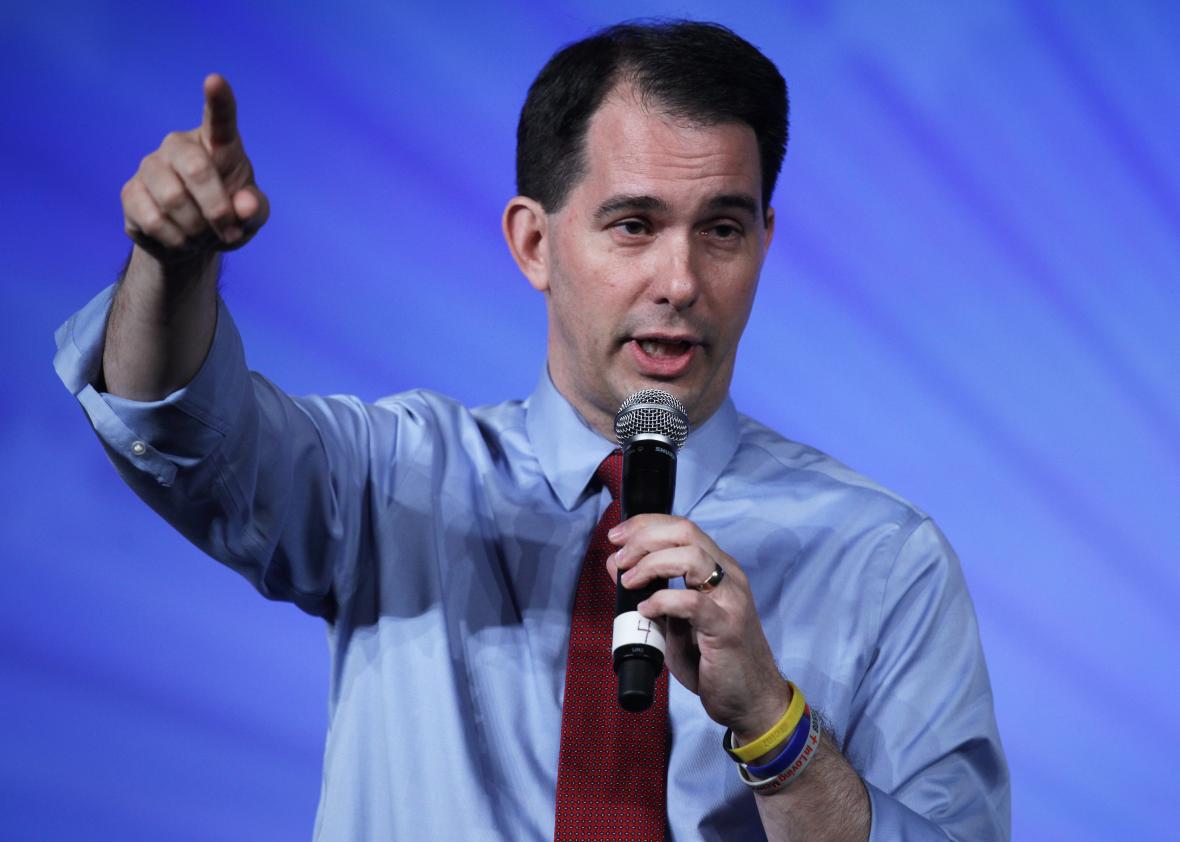Wisconsin Gov. Scott Walker is officially launching his Republican presidential primary campaign Monday with lots of reasons to be happy. Walker is considered one of the potential favorites in a field with no clear front-runner and is a personal darling of powerful conservative voices, such as influential donors David and Charles Koch. Walker also starts the race with an early advantage in the first-in-the-nation caucuses of Iowa, where recent polls have him up on his nearest challengers by 8 and 6 points, respectively.
While Iowa Republicans might be excited by the prospect of a Walker presidency, there’s a nearby state where people are less fond of Walker: Wisconsin. The latest job approval numbers on Walker out of his state had him at a pitiful 41 percent in a pair of April polls. His disapproval number in one poll by St. Norbert College, Wisconsin Public Radio, and Wisconsin Public Television was 58 percent, and in the same poll 59 percent of Wisconsin adults didn’t even want him to run for president. In that survey a full 60 percent of respondents said he would make a “poor” or “not so good” president, including 44 percent who went with the former.
That survey bore out the results of a similar one conducted around the same time by Marquette Law School, which found that 56 percent of registered Wisconsin voters disapproved of the job he was doing as governor and 53 percent said the state was on the “wrong track.”
The point is that—however he does in the rest of the country—a Walker nomination is not likely to turn Wisconsin red for the first time since 1984. Republicans had hoped that having Rep. Paul Ryan on the presidential ticket in 2012 might boost their chances in the state, but they ended up losing by a full 7 points. Having Walker on the ticket would not likely offer an improvement. If anything, it could hurt the party in the Badger State.
Walker boosters like to tout the fact that he has won not two but three gubernatorial campaigns in the last five years while pushing staunchly conservative policies in a firmly blue state. But each of those three wins, including his victory in 2012’s recall election, came from smaller and more Republican electorates than you get in national votes in Wisconsin. The 57.8 percent who turned out for Walker’s June recall campaign was the largest number in a state gubernatorial race in at least the last 64 years. But even that mark was dwarfed by the number of Wisconsinites who voted in the 2012 presidential election, when the state saw more than 70 percent of voters turn out—the second-highest number in the entire country.
That turnout number is a fairly consistent one for Wisconsin in recent national elections, and those national electorates have been far friendlier to Democrats. Judging by the unpopularity of Walker’s policies in the state, hitting that 70 percent turnout number might not even be necessary for a Democratic opponent to defeat a hypothetical Walker candidacy in Wisconsin in 2016. As the Washington Post reported Monday, Walker has been criticized by both state Democrats and Republicans for supporting $250 million in taxpayer funding for a new stadium for the Milwaukee Bucks, a stance similar to one that was opposed by 79 percent of Wisconsin voters in April’s Marquette poll. At the same time, Walker has slashed education spending in his newly signed state budget with $250 million in cuts to the University of Wisconsin. In the Marquette poll, 70 percent of Wisconsin voters opposed $300 million in proposed cuts to the university system, while 78 percent opposed Walker’s then-proposed cuts to the K–12 school budget.
While Wisconsin is a traditionally Democratic-leaning state that would likely not be in play no matter who was at the top of the GOP ticket, a campaign by someone as unpopular as Walker could have follow-on effects for the state’s Senate election. In that race, incumbent Republican Ron Johnson was trailing potential challenger and former Sen. Russ Feingold by 16 points in that same April Marquette poll.
